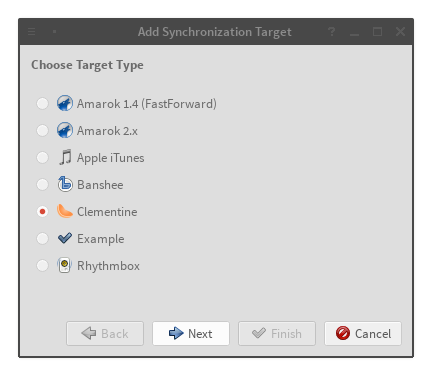GSoC Status Update – Week 10
27 Aug 2013This is a status update for my Google Summer of Code 2013 project - implementing advanced statistics importers for Amarok. Please read the first post if you would like to know more about the project.
Fixing
Last week I fixed Amarok 2.x embedded database importer. There were quite a few problems with handling an external database process:
- if the
QProcessobject received commands (start(),kill(),terminate()) from a different thread than that which has created it, it resulted in wrong behavior, often in the form of a crash (can't get much wronger than that) - the
QProcessobject does not encapsulate the process; it's only an interface. When aQProcessobject was destroyed while the process was still running, it issued a warning and killed the process with SIGKILL. Normally you'd want to stop an ongoing process with a SIGTERM, so manual lifetime management is needed - if the server has stopped (which it does, after a period of inactivity),
calling
QSqlDatabase::removeDatabase()resulted in a SIGPIPE signal from inside the MySQL driver - related to that, an old
QSqlDatabaseconnection silently failed to work if the server has been restarted. There would be no warnings onQSqlDatabase::open().
There was also a question of waiting for mysqld process to be ready to serve. After some research I decided to adopt an approach that MySQL startup scripts (including the "official" script, mysql.server) use, which is to wait for the server's PID file to be modified. Overall, I'm quite satisfied with the results; it's reliable and fast enough.
Creating
By the way, there's a new statistics synchronization target: Clementine.

This brings the total number of importers to six, and marks the end of implementing new importers. From now on, I intend to focus on existing code including, but not limited to, read-write capabilities and - of course - testing.
Simplifying
You may have noticed one additional target on the screenshot above: "Example." Another thing I focused on this week was code deduplication and simplifying creation of new importers. To show off, I prepared a basic "Example" importer. Below is the full C++ code. Bear in mind that aside from the code, importers need a plugin's *.desktop file and a CMakeLists.txt file. Also bear in mind that with this code the importer is already fully reconfigurable and instances of it can be created and removed at user's leisure.
#include "importers/SimpleImporterConfigWidget.h"
#include "importers/SimpleImporterManager.h"
#include "importers/ImporterProvider.h"
#include "statsyncing/SimpleTrack.h"
using namespace StatSyncing;
class ExampleConfigWidget : public SimpleImporterConfigWidget
{
public:
explicit ExampleConfigWidget( const QVariantMap &config, QWidget *parent = 0, Qt::WindowFlags f = 0 )
: SimpleImporterConfigWidget( "Example", config, parent, f ) {}
};
class ExampleProvider : public ImporterProvider
{
public:
ExampleProvider( const QVariantMap &config, ImporterManager *manager )
: ImporterProvider( config, manager ) {}
qint64 reliableTrackMetaData() const { return Meta::valTitle | Meta::valArtist | Meta::valAlbum; }
qint64 writableTrackStatsData() const { return 0; }
QSet<QString> artists() { return QSet<QString>() << "ExampleArtist"; }
TrackList artistTracks( const QString &artistName )
{
Meta::FieldHash metadata;
metadata.insert( Meta::valArtist, artistName );
metadata.insert( Meta::valTitle, "ExampleTitle" );
metadata.insert( Meta::valAlbum, "ExampleAlbum" );
metadata.insert( Meta::valRating, 10 );
return TrackList() << TrackPtr( new SimpleTrack( metadata ) );
}
};
AMAROK_EXPORT_SIMPLE_IMPORTER_PLUGIN( example, "ExampleImporter", i18n( "Example" ),
i18n( "Example Statistics Importer" ), KIcon( "dialog-ok" ),
ExampleConfigWidget, ExampleProvider )

As always, you can check out my progress on my [public Amarok clone. The branch
is named gsoc-importers.
Thanks for reading!